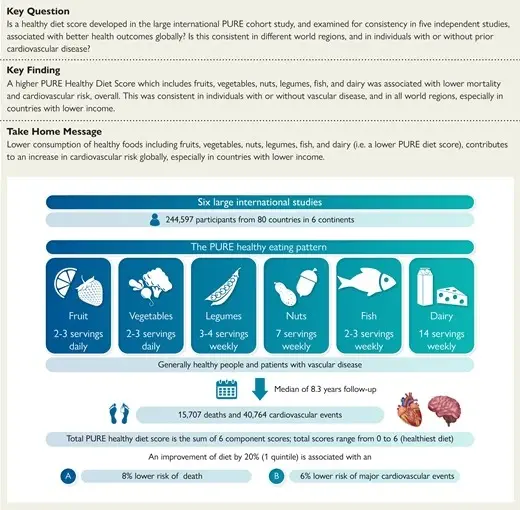Consuming fruits, vegetables, legumes, nuts, fish and whole-fat dairy products is key to lowering the risk of cardiovascular disease, including heart attacks and strokes. The study also found that a healthy diet can be achieved in various ways, such as including moderate amounts of whole grains or unprocessed meats.
The World Health Organization estimates ~18 million people died from cardiovascular disease in 2019, representing 32% of all global deaths. Of these deaths, 85% were due to heart attacks and strokes. Population Research Health Institute researchers and their global collaborators analyzed data from 245,000 people in 80 countries from multiple studies.



While this is certainly true, I feel the need to say here that the first time I looked at the contestants of an ultra-marathon event near me I was surprised to find that there were people well over their fifties participating. I mean, at least as far as this habit goes, their metabolism can’t be very slow…
True, but it isn’t just about fast or slow. Some things I used to be able to eat, I can’t anymore. Stuff that used to make me feel crappy, might make me feel good now. I never used to be a breakfast person. Recently, I’ve become a breakfast person.
Yep, by definition metabolism is the sum of all chemical reactions in an organism! It’s like the confusion with hypothesis and theory in media today, metabolism has basically been neutered the same way.
This is true, as @shreddy_scientist@lemmy.ml pointed out it’s all of it, both the kind and the volume over time. What I wanted to challenge with my comment is the misconception that many of the adaptations, which affect our metabolisms, triggered by physical exercise are no longer accessible when we get older. Which is not incorrect, but the degree to which I notice this belief being held to, usually is. Also, as far as exercise goes, strength or skill training might decline noticeably (depending on the level each one of us took advantage of our youth) with age, but endurance training, if done properly, will not, at least not significantly or very early. In the context of the original post and article that focuses on CVD, this is quite optimistic.
If you examine proper running form it makes sense to see people in their fifties and sixties running good times on marathons and ultra-marathons. So it is a habit that can support quite good health conditions even later in life. Also, on the same note, another inspiring example from an endurance training perspective.
But this is where my mind went when I read your sentence about habits sustaining a persons health, mostly because I tend to think that our bodies are designed to move quite a lot and food comes second to activity, to assist and support the adaptations and to fuel the movement. Your last examples make me think that you were referring to eating habits alone, so I probably misread your original comment, sorry :-)